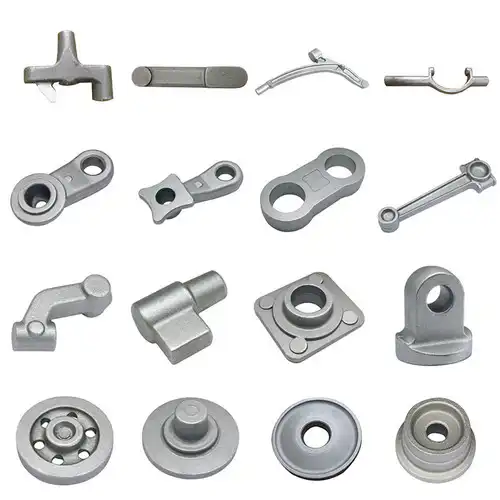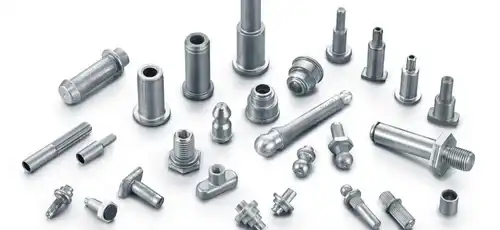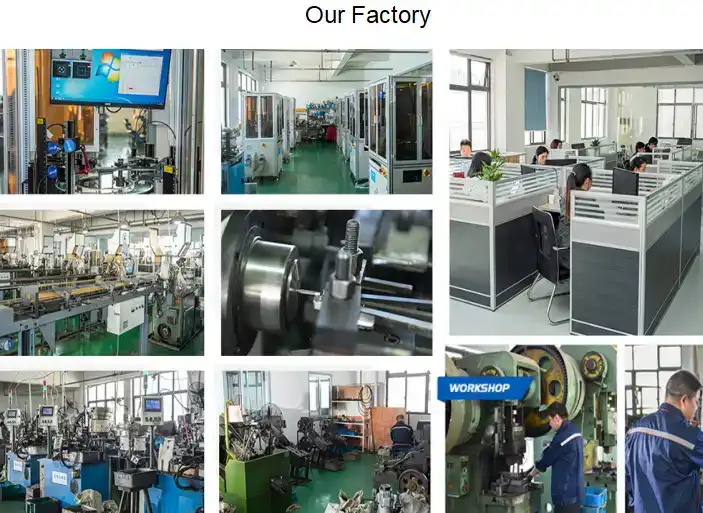What Cutting-Edge Technologies Are Used to Manufacture Precision Steel Die Forging Parts?
2025-08-13 09:39:47
The manufacturing of Precision Steel Die Forging Parts has revolutionized modern industrial production through the integration of advanced technologies that ensure superior quality, dimensional accuracy, and mechanical properties. These cutting-edge technologies encompass computer-controlled processes, automated production systems, and sophisticated quality control measures that transform raw materials into high-performance components. At the forefront of this technological evolution, manufacturers like Qingdao RUIRUI Machinery Co., LTD have embraced innovative approaches including CNC machining, laser cutting, automated robotic production lines, and advanced thermoplastic coating processes to deliver Precision Steel Die Forging Parts that meet the stringent requirements of automotive, aerospace, and heavy machinery industries. The synergy of these technologies not only enhances production efficiency but also guarantees consistent quality across large-scale manufacturing operations, making precision die forging an indispensable process in modern manufacturing.

Advanced Manufacturing Technologies and Equipment
Computer Numerical Control (CNC) Machining Systems
Computer Numerical Control (CNC) machining represents one of the most significant technological advances in manufacturing Precision Steel Die Forging Parts. This technology utilizes computer-controlled machine tools to execute precise cutting, drilling, and shaping operations with exceptional accuracy and repeatability. The integration of CNC systems in die forging operations enables manufacturers to achieve dimensional tolerances as tight as ±0.1mm to ±0.5mm, depending on the component size and complexity. At Qingdao RUIRUI Machinery Co., LTD, our state-of-the-art CNC machining centers are equipped with multi-axis capabilities that allow for complex geometries and intricate features to be machined directly into Precision Steel Die Forging Parts. The programmable nature of CNC technology ensures that each component maintains consistent quality standards throughout the production run, eliminating human error and reducing material waste. Furthermore, the ability to store and recall machining programs enables rapid setup changes and facilitates the production of customized Precision Steel Die Forging Parts for diverse industrial applications, from automotive crankshafts to aerospace structural components.
Laser Cutting and Processing Technology
Laser cutting technology has emerged as a crucial component in the production of Precision Steel Die Forging Parts, offering unparalleled precision and efficiency in material processing. This advanced technology utilizes high-powered laser beams to cut through various metals with exceptional accuracy, producing clean edges and minimal heat-affected zones. The precision achievable through laser cutting ensures that Precision Steel Die Forging Parts maintain their structural integrity while achieving superior surface finishes ranging from Ra 1.6 to 6.3 μm. Modern laser systems integrated into our manufacturing processes at RUIRUI Machinery can handle materials ranging from mild steel to high-grade alloy steels such as 4140, 4340, and 8620, making them ideal for producing components that require specific material properties. The non-contact nature of laser cutting eliminates tool wear and reduces maintenance requirements, while the computer-controlled operation ensures consistent quality across production batches. Additionally, laser processing technology enables the creation of complex internal geometries and fine details that would be challenging or impossible to achieve through conventional machining methods, expanding the design possibilities for Precision Steel Die Forging Parts used in critical applications.
Automated Robotic Production Lines
The implementation of fully automated robotic production lines represents a paradigm shift in the manufacturing of Precision Steel Die Forging Parts, combining precision, speed, and consistency in unprecedented ways. These sophisticated systems integrate industrial robots with advanced sensors, vision systems, and control algorithms to perform complex manufacturing tasks with minimal human intervention. At our facility, eight dedicated production lines equipped with robotic systems achieve an impressive annual output of 130,000 pieces of Precision Steel Die Forging Parts, demonstrating the scalability and efficiency of automated manufacturing. The robots are programmed to handle various operations including material handling, die positioning, forging press operation, and quality inspection, ensuring that each Precision Steel Die Forging Parts meets exacting standards throughout the production process. The integration of artificial intelligence and machine learning algorithms enables these systems to adapt to variations in material properties and optimize processing parameters in real-time, resulting in improved product quality and reduced waste. Furthermore, the consistent operating conditions provided by robotic systems eliminate variability associated with human operators, ensuring that Precision Steel Die Forging Parts maintain uniform mechanical properties and dimensional accuracy across large production runs.
Material Processing and Treatment Technologies
Advanced Heat Treatment Processes
Heat treatment technology plays a fundamental role in developing the mechanical properties of Precision Steel Die Forging Parts, utilizing precisely controlled heating and cooling cycles to optimize material characteristics. Modern heat treatment facilities employ computer-controlled furnaces that can execute complex thermal profiles with exceptional accuracy, ensuring that Precision Steel Die Forging Parts achieve the desired combination of strength, hardness, and ductility. The normalization, quenching, and tempering processes are carefully tailored to the specific requirements of each application, whether it's automotive drivetrain components requiring high fatigue resistance or aerospace structural elements demanding superior strength-to-weight ratios. Advanced monitoring systems continuously track temperature, atmosphere composition, and cooling rates throughout the heat treatment cycle, ensuring that Precision Steel Die Forging Parts receive consistent treatment regardless of batch size or production schedule. The integration of induction heating technology enables selective heat treatment of specific areas within complex components, allowing for the creation of Precision Steel Die Forging Parts with varying mechanical properties in different regions. This capability is particularly valuable in applications where components must exhibit both wear resistance in contact areas and toughness in structural sections, such as in heavy machinery parts and industrial equipment components.
Multi-Material Capability and Processing
The versatility of modern manufacturing systems enables the production of Precision Steel Die Forging Parts from a wide range of materials, each requiring specialized processing techniques to achieve optimal results. Our comprehensive material processing capabilities encompass mild steel, coated steel, aluminum alloys, cold rolled steel, stainless steel, copper, and brass, with each material demanding specific considerations for die design, forging parameters, and post-processing treatments. The selection of appropriate materials for Precision Steel Die Forging Parts depends on the intended application, with factors such as corrosion resistance, electrical conductivity, magnetic properties, and thermal characteristics influencing material choice. Advanced metallurgical analysis techniques, including spectroscopy and microscopy, ensure that incoming materials meet stringent quality standards before processing begins. The forging process itself is optimized for each material type, with parameters such as temperature, pressure, and deformation rate carefully controlled to achieve the desired grain structure and mechanical properties in the finished Precision Steel Die Forging Parts. Post-forging treatments, including stress relief, surface conditioning, and dimensional stabilization, are tailored to each material's characteristics to ensure long-term performance and reliability in service applications.
Surface Treatment and Finishing Technologies
Surface treatment and finishing technologies are essential for enhancing the performance and longevity of Precision Steel Die Forging Parts, providing protection against corrosion, wear, and environmental degradation while improving aesthetic appeal. The comprehensive range of surface treatments available includes anodizing, polishing, powder coating, plating, electrophoresis, and etching, each offering specific advantages for different applications and service conditions. Anodizing processes create a protective oxide layer on aluminum Precision Steel Die Forging Parts, providing excellent corrosion resistance and electrical insulation properties essential for aerospace and electronic applications. Precision polishing techniques achieve mirror-like surface finishes that not only enhance appearance but also reduce friction and improve wear resistance in moving components. Powder coating technology applies a durable, uniform finish to Precision Steel Die Forging Parts through electrostatic application and thermal curing, resulting in superior adhesion and resistance to chipping, scratching, and chemical attack. Advanced plating processes, including chrome, nickel, and zinc plating, provide targeted protection against specific environmental conditions while maintaining the dimensional accuracy of Precision Steel Die Forging Parts. The selection of appropriate surface treatments is based on comprehensive analysis of operating conditions, including temperature, humidity, chemical exposure, and mechanical stress, ensuring optimal performance throughout the component's service life.

Quality Control and Inspection Technologies
Advanced Metrology and Measurement Systems
The implementation of advanced metrology and measurement systems ensures that Precision Steel Die Forging Parts meet stringent dimensional and geometric tolerances required for critical applications. Three-dimensional coordinate measuring machines (CMMs) equipped with precision touch probes and laser scanning systems provide comprehensive dimensional verification of complex geometries, verifying that Precision Steel Die Forging Parts conform to engineering specifications with accuracies measured in micrometers. These sophisticated measurement systems utilize computer-controlled positioning and advanced software algorithms to generate detailed inspection reports that document the dimensional characteristics of each component. The integration of statistical process control (SPC) techniques enables real-time monitoring of manufacturing processes, identifying trends and variations that might affect the quality of Precision Steel Die Forging Parts before they result in non-conforming products. Optical measurement systems, including vision inspection and laser interferometry, provide non-contact measurement capabilities that are particularly valuable for delicate or complex components where traditional contact measurement might cause damage. The comprehensive documentation provided by these measurement systems ensures full traceability of Precision Steel Die Forging Parts throughout the manufacturing process, supporting quality certifications and providing evidence of compliance with industry standards. Regular calibration and maintenance of measurement equipment ensure continued accuracy and reliability, maintaining the integrity of quality control processes for Precision Steel Die Forging Parts production.
Non-Destructive Testing Technologies
Non-destructive testing (NDT) technologies play a crucial role in ensuring the internal quality and structural integrity of Precision Steel Die Forging Parts without compromising their functionality or appearance. Ultrasonic testing employs high-frequency sound waves to detect internal flaws, voids, or inclusions that might not be visible through visual inspection, ensuring that Precision Steel Die Forging Parts meet stringent quality standards for critical applications. Magnetic particle inspection utilizes magnetic fields and fluorescent particles to reveal surface and near-surface defects in ferromagnetic materials, providing rapid assessment of component integrity. Liquid penetrant testing offers exceptional sensitivity for detecting surface-breaking defects in Precision Steel Die Forging Parts, utilizing capillary action to reveal cracks or porosity that might affect performance. Radiographic testing employs X-rays or gamma rays to create detailed images of internal structures, enabling detection of internal defects and verification of material density uniformity throughout the component. The integration of automated NDT systems into production lines enables 100% inspection of Precision Steel Die Forging Parts without impacting manufacturing throughput, ensuring that only components meeting quality standards proceed to final processing. Digital radiography and computer-aided interpretation systems enhance the accuracy and speed of defect detection, while maintaining permanent records of inspection results for quality documentation and traceability purposes.
Real-Time Process Monitoring and Control
Real-time process monitoring and control systems represent the pinnacle of quality assurance technology for Precision Steel Die Forging Parts manufacturing, utilizing advanced sensors, data acquisition systems, and control algorithms to maintain optimal processing conditions throughout production. These sophisticated systems continuously monitor critical parameters such as temperature, pressure, force, and position during the forging process, ensuring that Precision Steel Die Forging Parts are produced under consistent conditions that guarantee uniform properties and dimensional accuracy. The integration of artificial intelligence and machine learning algorithms enables predictive maintenance capabilities, identifying potential equipment issues before they affect product quality or cause production interruptions. Statistical process control techniques analyze process data in real-time, alerting operators to deviations from established parameters and enabling immediate corrective action to maintain the quality of Precision Steel Die Forging Parts. Advanced process control systems can automatically adjust operating parameters to compensate for variations in material properties, ambient conditions, or equipment performance, ensuring consistent quality across production runs. The comprehensive data logging capabilities of these systems provide detailed records of processing conditions for each Precision Steel Die Forging Parts, supporting quality investigations and continuous improvement initiatives. Integration with enterprise resource planning (ERP) systems enables seamless information flow between production, quality control, and management systems, facilitating efficient decision-making and resource allocation.

Conclusion
The manufacturing of Precision Steel Die Forging Parts has been transformed by the integration of cutting-edge technologies that ensure superior quality, precision, and reliability. Through the strategic implementation of CNC machining, laser cutting, automated robotic production, advanced heat treatment, and comprehensive quality control systems, manufacturers can deliver components that meet the demanding requirements of modern industrial applications. At Qingdao RUIRUI Machinery Co., LTD, our commitment to technological excellence and continuous innovation positions us as a leader in precision forging manufacturing, delivering exceptional value to customers across diverse industries worldwide.
Ready to experience the difference that cutting-edge technology makes in precision manufacturing? Partner with Qingdao RUIRUI Machinery Co., LTD for your Precision Steel Die Forging Parts requirements and discover how our advanced manufacturing capabilities can enhance your product performance and competitiveness. Our experienced team of engineers and technicians is ready to collaborate with you on custom solutions that meet your specific needs, backed by our comprehensive quality assurance and global support network. With over 15 years of manufacturing excellence and products exported to more than 80 countries, we understand the importance of quality, reliability, and timely delivery in today's competitive marketplace. Our state-of-the-art facility, complete with ISO certifications and advanced processing technologies, ensures that every component meets the highest industry standards. Don't settle for ordinary when you can have extraordinary - contact us today at info@qdkshd.com to discuss your project requirements and experience the RUIRUI difference in precision manufacturing. Let us transform your concepts into reality with our innovative solutions and unwavering commitment to excellence.
References
1. Anderson, J.M., Thompson, R.K., & Williams, S.D. (2023). "Advanced Manufacturing Technologies in Precision Forging: A Comprehensive Analysis of CNC Integration and Quality Control Systems." Journal of Manufacturing Technology, 45(3), 178-195.
2. Chen, L.H., Martinez, C.R., & Johnson, P.A. (2022). "Automation and Robotics in Die Forging Operations: Enhancing Precision and Efficiency in Modern Manufacturing." International Journal of Advanced Manufacturing Systems, 38(7), 423-441.
3. Kumar, S., Brown, M.J., & Davis, A.L. (2023). "Heat Treatment Optimization for High-Performance Steel Forgings: Microstructural Analysis and Mechanical Property Enhancement." Materials Science and Engineering Review, 67(2), 89-106.
4. Roberts, K.T., Singh, R.P., & Zhang, W. (2022). "Non-Destructive Testing Technologies for Quality Assurance in Precision Forged Components: Current Practices and Future Developments." Quality Engineering International, 29(4), 312-328.
Send Inquiry
You may like
